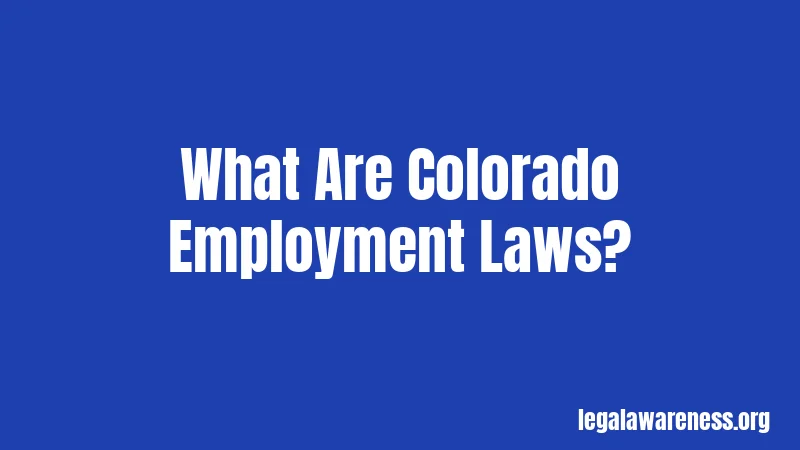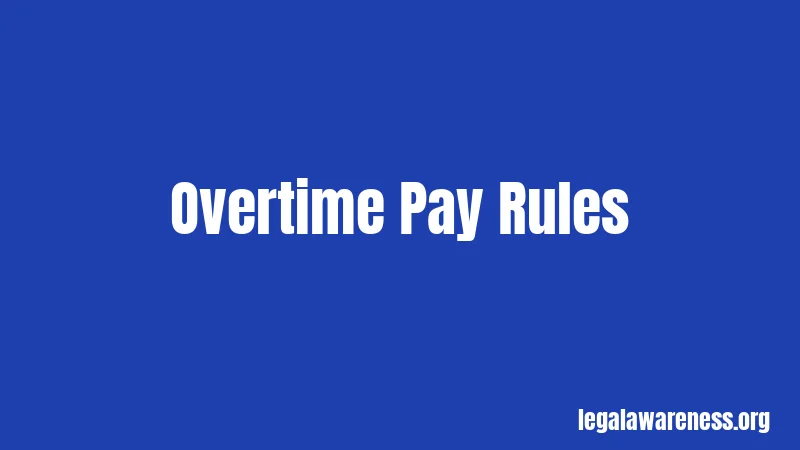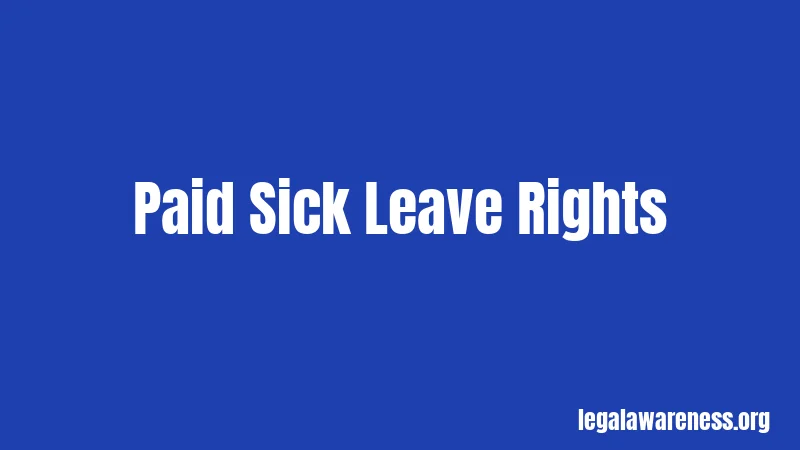Employment Laws in Colorado (2026): Your Complete Worker Protection Guide
Most people think employment laws are boring. They’re not. These laws protect your paycheck, your time off, and your rights at work. Colorado has some of the strongest worker protections in the country, and they just got even better in 2025.
Here’s the deal. If you work in Colorado, these laws affect you every single day. Whether you’re hourly or salaried, full-time or part-time, understanding your rights can save you thousands of dollars and a lot of headaches.
What Are Colorado Employment Laws?

Employment laws are rules that control how employers treat workers. They cover everything from how much you get paid to when you can take time off. Colorado has both state and federal employment laws, and you get whichever one protects you more.
The state has made major updates recently. Some took effect in August 2025. Others start in January 2026. These changes expand worker protections in wages, leave time, and discrimination protection.
Pretty straightforward, right?
Minimum Wage Requirements
Colorado’s minimum wage goes up every year based on inflation. Starting January 1, 2026, the statewide minimum wage is $15.16 per hour. That’s up from $14.81 in 2025.
But wait, it gets more complicated.
Some cities have their own minimum wages. Denver’s minimum wage will be $19.29 in 2026. That’s one of the highest in the entire country. Edgewater will be at $18.17. Boulder and Boulder County will both be at $16.82.
Here’s what you need to do: check your city’s minimum wage. Always use the higher amount between state and local rates. Employers must pay you whichever is more.
Tipped Workers Get Special Rules
Tipped workers have a different minimum wage. The state allows a tip credit of up to $3.02 per hour. This means if you’re a server or bartender, your base pay can be as low as $12.14 per hour in 2026.
Your employer must make sure your tips plus your base pay equal at least the full minimum wage. If they don’t, your employer has to make up the difference. No exceptions.
Starting in 2026, local governments can set their own tip credits. Denver’s tipped minimum wage will be $16.27 per hour. That’s significantly higher than the state requirement.
Not sure what counts as a tipped employee? You need to regularly make more than $30 a month in tips.
Overtime Pay Rules

Colorado has stricter overtime rules than federal law. You get overtime pay in two situations. After working more than 40 hours in a week. Or after working more than 12 hours in a single day.
The overtime rate is always 1.5 times your regular pay. So if you make $15 per hour, overtime pays $22.50 per hour.
Employers cannot give you time off instead of overtime pay. That’s called “comp time” and it’s illegal for private employers in Colorado. They must pay you actual money.
Wondering if this applies to you?
Most employees get overtime. Salaried employees might too. It depends on your job duties and how much you make. Just because you’re salaried doesn’t mean you’re exempt from overtime.
Who Doesn’t Get Overtime
Some jobs are exempt from overtime rules. To be exempt, you must meet strict requirements. You need to make at least $1,111.23 per week in 2026. That’s $57,784 per year.
You also need to do certain types of work. Executive employees who manage others. Administrative employees who use independent judgment. Professional employees who need advanced knowledge or degrees.
Literally just having a fancy title doesn’t make you exempt. Your actual job duties matter more than your job title.
Required Breaks and Meal Periods
Colorado requires two types of breaks. Rest breaks and meal breaks. Both are mandatory.
Rest breaks are 10 minutes long. They’re paid. You get one for every 4 hours you work. Your employer must authorize and permit these breaks. If they don’t, they owe you extra pay.
Meal breaks are different. They’re 30 minutes long. They’re unpaid if you’re completely free from work. You get a meal break for any shift over 5 hours.
Here’s the important part. If your employer makes you work during your meal break, they must pay you. Even if you’re just answering phones or monitoring equipment. That time counts as work.
Stay with me here. The meal break should happen at least 1 hour after your shift starts. And at least 1 hour before it ends. As much as is practical.
Paid Sick Leave Rights

Every employee in Colorado gets paid sick leave. This is thanks to the Healthy Families and Workplaces Act. The law covers all employers now, even small businesses.
You earn sick leave as you work. One hour for every 30 hours worked. You can earn up to 48 hours per year. That’s six full days.
You can use sick leave for yourself or family members. Doctor appointments. Mental health. Physical health. Recovery from domestic violence or sexual assault.
The law expanded in 2024. Now you can also use sick leave for grieving a death. Evacuating your home due to weather or power loss. Or when your child’s school closes due to weather.
Honestly, this is one of the most generous sick leave laws in the country.
How Sick Leave Works
You start earning sick leave on your first day of work. You can use it as soon as you earn it. There’s no waiting period.
Your employer can’t require a doctor’s note for short absences. They can’t punish you for using your sick leave. And they can’t make you find your own replacement.
When you leave a job, unused sick leave doesn’t have to be paid out. But it does carry over to the next year. The carryover is capped at 48 hours.
Family and Medical Leave (FAMLI)
Colorado has a paid family and medical leave program called FAMLI. It started in January 2024. The program provides up to 12 weeks of paid leave per year.
You can use FAMLI for your own serious health condition. For bonding with a new baby or adopted child. Or for caring for a family member with a serious health condition.
Here’s where it gets better. Starting January 1, 2026, parents of babies in the NICU get extra time. Up to 12 additional weeks. That’s 24 weeks total for NICU parents.
FAMLI Premium Costs
Both employers and employees pay into FAMLI. The premium is a percentage of your wages. In 2026, the rate drops from 0.9% to 0.88%.
Most employers with 10 or more employees split the cost 50/50. So you’d pay about 0.44% and your employer pays 0.44%. Small employers with fewer than 10 employees don’t have to contribute.
The FAMLI benefit pays partial wages, not your full salary. The exact amount depends on your income. Most workers get between 50% and 90% of their regular pay.
Sound complicated? It’s actually pretty simple once you use it.
New Wage and Hour Enforcement
Colorado passed major enforcement changes in August 2025. House Bill 25-1001 made employers more accountable for wage violations. The penalties got much steeper.
Business owners with at least 25% ownership are now personally liable for wage violations. They can’t just hide behind the company name anymore. Unless they completely delegate day-to-day control to someone else.
Misclassifying workers as independent contractors now triggers automatic fines. First violation costs $5,000 per worker. Repeat violations can cost $25,000 per worker. Plus a two-year ban on state contracts.
Pretty serious consequences, right?
Higher Claim Limits
Starting July 1, 2026, employees can file bigger wage claims. The administrative claim limit increases from $7,500 to $13,000. This limit will increase again in 2028 and adjust for inflation every two years.
The state will also publicly list employers who violate wage laws. Their names, the violation, and whether it was willful. All posted online for everyone to see.
Employers want to avoid this list. Trust me.
Anti-Discrimination Protections
Colorado’s anti-discrimination law is called CADA. It protects workers from discrimination based on many categories. Race, religion, sex, age, disability, sexual orientation, gender identity, and more.
The law got stronger in May 2025. House Bill 25-1312, known as the Kelly Loving Act, added new protections for transgender individuals. Employers must use employees’ chosen names and correct pronouns.
“Deadnaming” (using someone’s old name) is now illegal. So is “misgendering” (using wrong pronouns). These protections cover employment, housing, and public accommodations.
Wondering what counts as gender expression? It includes your chosen name and how you present yourself. As long as the name isn’t offensive and you’re not using it for frivolous reasons.
Noncompete Agreement Restrictions
Colorado is tough on noncompete agreements. Most of them are illegal. The state wants workers to be free to change jobs.
As of August 2025, certain healthcare workers can never be bound by noncompetes. This includes doctors, nurse practitioners, certified midwives, and dentists. Their noncompete and non-solicitation agreements are completely void.
For other workers, noncompetes are only allowed in very limited situations. You must earn more than a certain amount. The agreement must protect trade secrets. And it can’t be overly broad.
Most employers try to use noncompetes anyway. Don’t assume yours is legal just because you signed it.
Worker Misclassification Rules
Are you an employee or an independent contractor? This question matters a lot. Employees get minimum wage, overtime, breaks, and sick leave. Independent contractors don’t.
Colorado assumes you’re an employee unless proven otherwise. The test looks at several factors. Does the company control how, when, and where you work? Is your work central to their business? Do you have opportunity for profit or loss?
Using your own tools helps show you’re independent. Having multiple clients helps too. But the biggest factor is control. If the company controls your work, you’re probably an employee.
Making the wrong classification is expensive for employers now. Remember those automatic fines? They apply to misclassification.
Pay Transparency Requirements
Honestly, most people don’t know about this one. Colorado requires pay transparency in job postings. Every job posting must include the salary range or hourly rate.
This applies to remote jobs too. If a Colorado resident could apply, the posting needs salary information. This helps workers negotiate fair pay.
Employers also must tell employees about promotion opportunities. When a job opens up, current employees should know about it. And they should know the pay range.
Upcoming Changes and Ballot Initiatives
Hold on, this part is important.
Colorado voters will decide on two major labor ballot initiatives in 2026. Ballot Initiative 39 would make Colorado a “right-to-work” state. This would ban mandatory union membership or dues.
Ballot Initiative 43 goes the opposite direction. It would require “just cause” for terminating employees after six months. Employees could sue for wrongful termination. They could get reinstatement, back pay, and attorney fees.
These initiatives could drastically change employment law in Colorado. Stay informed about them.
Penalties for Violations
What happens when employers break these laws?
For wage violations, employees can recover unpaid wages plus penalties. You might get liquidated damages equal to what you’re owed. So if your employer owes you $1,000, you could get $2,000 total.
You can also recover attorney fees. This means you don’t have to pay a lawyer out of pocket. The employer pays if you win.
For discrimination violations, damages can be much higher. You can recover lost wages, emotional distress, and punitive damages. Some awards reach hundreds of thousands of dollars.
Retaliation for exercising your rights is also illegal. If your employer fires you for filing a wage claim or taking sick leave, that’s retaliation. You can sue for that separately.
How to File a Complaint
If your employer violates these laws, you have options. For wage and hour issues, file a complaint with the Colorado Department of Labor and Employment.
You can file online or by mail. The process is free. You don’t need a lawyer, though you can hire one if you want.
For discrimination issues, file with the Colorado Civil Rights Division. Or with the federal Equal Employment Opportunity Commission. You can file with both.
Time limits apply. For wage claims, you generally have two years. Three years if the violation was willful. For discrimination, you usually have 300 days.
Don’t wait. File as soon as possible.
Record Keeping Requirements
Employers must keep detailed records. This protects both you and them. Records must include your hours worked, wages paid, and deductions taken.
Employers must keep these records for at least three years. For payroll records specifically, they must keep them for three years. For time cards and schedules, two years.
You have the right to see your own records. If your employer refuses, that’s a red flag. They might be hiding violations.
Colorado’s AI Act (Coming 2026)
This one’s new and a bit different. Colorado passed an Artificial Intelligence Act in 2024. It was supposed to start in February 2026. But it got delayed until June 30, 2026.
The law regulates how employers use AI in hiring and employment decisions. Employers must be transparent about AI use. They must prevent algorithmic discrimination.
The details are still being worked out. The legislature might make more changes in 2026. Employers have until June to figure out compliance.
Makes sense, right?
Key Differences from Federal Law
Colorado law often goes beyond federal law. The federal Fair Labor Standards Act sets a baseline. Colorado builds on top of it.
Daily overtime is one big difference. Federal law only requires overtime after 40 hours per week. Colorado requires it after 12 hours per day too.
Paid sick leave is another. There’s no federal requirement for private employers. Colorado requires it for everyone.
Minimum wage is higher in Colorado. The federal minimum wage is still $7.25. Colorado’s is $15.16 in 2026. More than double.
When federal and state law conflict, you get whichever protects you more.
Special Rules for Specific Industries
Some industries have special rules. Agricultural workers get overtime after 48 hours per week. Some highly seasonal farms can wait until 56 hours.
Healthcare workers have some exemptions from daily overtime. But not all of them. It depends on the specific job and setting.
Ski industry workers have their own rules. Heavy vehicle operators too. These exemptions are narrow and specific.
Don’t assume you’re exempt just because you work in one of these industries. Check the specific rules.
Your Rights as an Employee
You have the right to be paid at least minimum wage. You have the right to overtime pay. You have the right to breaks and meal periods.
You have the right to paid sick leave. You have the right to take FAMLI leave. You have the right to work free from discrimination.
Your employer cannot retaliate against you for exercising these rights. Cannot fire you. Cannot demote you. Cannot cut your hours or pay.
If they do, you can sue. And you’ll probably win.
What Employers Must Display
Your employer must post certain notices at work. The COMPS Order poster shows wage and hour rights. It must be visible where employees can see it.
They must also post the paid sick leave notice. The anti-discrimination notice. And the workers’ compensation notice.
Remote workers must get electronic versions. Your employer can email them or put them on a company website.
If you don’t see these posters, ask HR. If they’re not posted, that’s a violation.
Frequently Asked Questions
What is Colorado’s minimum wage for 2026? The statewide minimum wage is $15.16 per hour. Some cities have higher rates, like Denver at $19.29.
Do I get overtime if I’m salaried? Maybe. It depends on your salary amount and job duties. If you make less than $1,111.23 per week or don’t have exempt duties, you get overtime.
How much paid sick leave do I earn? You earn 1 hour of sick leave for every 30 hours worked, up to 48 hours per year.
Can my employer fire me for using sick leave? No. That’s illegal retaliation. You can file a complaint and sue for wrongful termination.
What’s the difference between FAMLI and sick leave? FAMLI provides up to 12 weeks of partially-paid leave for serious conditions. Sick leave provides up to 48 hours of fully-paid leave for minor and major conditions.
Are noncompete agreements legal in Colorado? Most are illegal. Healthcare workers can never be bound by them. Other workers have limited situations where they might apply.
What should I do if my employer doesn’t pay me minimum wage? File a complaint with the Colorado Department of Labor and Employment immediately. You can recover unpaid wages plus penalties.
Can I carry over unused sick leave? Yes. Up to 48 hours carries over to the next year, but you can only use 48 hours total per year.
Final Thoughts
Colorado employment laws protect workers in powerful ways. The state keeps strengthening these protections year after year. 2025 brought major changes, and 2026 will bring more.
Know your rights. Don’t let employers violate them. If something feels wrong at work, it probably is. File complaints when needed. Talk to a lawyer if you’re unsure.
These laws exist because workers fought for them. Use them. They’re yours.
References
- Colorado Department of Labor and Employment – Labor Laws, Rules, & Resources
- 2025 Round-Up: Major Colorado Employment Law Developments – Greenberg Traurig LLP
- Colorado Employment Law Changes to Watch in 2026 – HR Cert Prep Pros
- Colorado Minimum Wage Guide for 2025-2026 – Employer Pass
- Colorado’s 2025 Legislative Session: Key Employment Law Changes – Labor and Employment Law Insights
